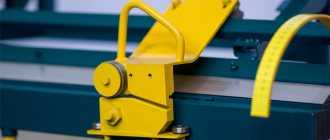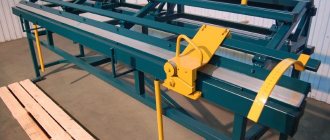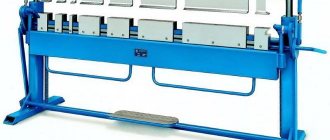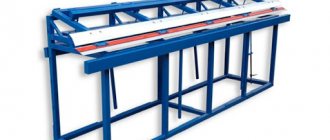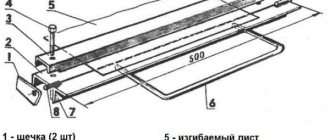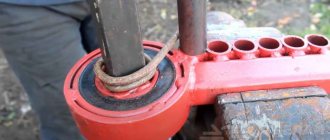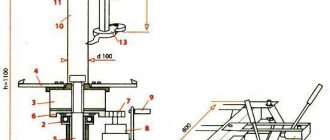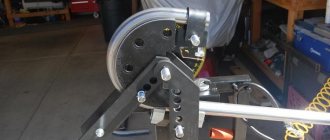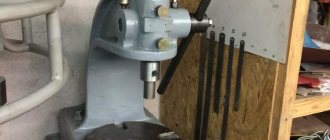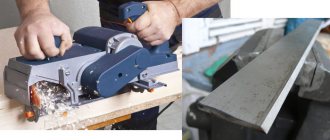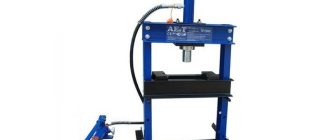Description of sheet metal bending machines
The Van Mark manual sheet bender is a fully equipped workplace where sheet material is cut and bent.
Devices for creating profiles from steel sheets are non-passable. The main technical parameter for them is the sheet feeding depth. Sheet benders from Van Mark have no analogues in the segment of such equipment, because their maximum feed value is 520 mm.
Sheet benders are produced in two categories depending on the intended use:
- Commercial;
- Industrial.
One group is used in small businesses, for example, for the manufacture of roofing profiles, and the other in large metallurgy and mechanical engineering enterprises.
The sheet benders are conveniently assembled and disassembled, which makes them mobile and easy to transport. The handles and racks of the brackets are quickly detached. One person can disassemble and assemble the unit in just a few minutes.
The parts of the sheet bending machine are made of high-tech and safe duralumin alloy.
Duralumin is used in the manufacture of Van Mark sheet bending machines
Van Mark or Tapco - which is better to choose?
Experienced builders are familiar with both brands.
In addition, the brands were created by one person (Jeff Van Cleve), only Tapco was created a little earlier. Both companies produce machines that are similar in price, design, size, and quality. They also have clamping jaws. What should you choose?
The sheet bending machine Van Mark and Tapco are considered equivalent devices, since they are competing companies that vigilantly monitor each other's innovations. There is an opinion that the clamp lever on the Van Mark is more convenient than that of the Tapko. Otherwise, there are no significant differences.
If your goal is to buy a sheet metal bending machine, you should familiarize yourself with the models of Van Mark. They are the best in their price segment, have a lot of advantages and are very durable. Do you have anything to tell us about these tools? Share your thoughts in the comments.
Main advantages
- Bending of metal sheets up to 1 mm thick;
- The largest bend angle is 180°;
- They work with workpieces from 2 to 4 meters long;
- There is no need to reconfigure when changing sheet thickness;
- Vinyl coating of work area elements prevents damage to the surface of the product;
- Reliability and efficiency;
- Durability;
- It is easy to master the basic principles of operation;
- Mobility due to low weight;
- Produced only in major US facilities.
The Van Mark sheet bender can bend sheets to any angle
The Van Mark sheet bending machine can be placed directly on the construction site. It is quickly mastered by the employee without prior training.
Other information from this section:
- Manual bending machine TAPCO MAX-I-MUM Port-O-Bender
- Manual bending machine TAPCO SuperMax
- Manual sheet bending machine TAPCO PRO
- Manual bending machine Mazanek ZGR 1
- Manual bending machine Mazanek ZGR 2
- Manual segmental bending machine Mazanek ZGRS series
- Manual bending machine Metal Master MFB series
- Manual segmental bending machine Metal Master MFS series
- Manual segmental bending machine Metal Master MTB series
- Manual bending machine Schechtl LBX series
- Manual segment bending machine Schechtl UK
- Electromagnetic manual sheet bender MAGNABEND
- Bertech bending machines ZG/0.7 series
- Bertech sheet bending series ZG/1.0 (LBA)
- Sheet benders Van Mark MetalMaster Industrial Series
- Van Mark MetalMaster Commercial series sheet benders
Basic structural elements and their features
Bending equipment, regardless of model, has the same layout. The Van Mark sheet bending machine consists of several units and components, each of which is functional and reliable.
List of basic structural elements.
Support stand
The reinforced design of the support column makes the machine stable and rigid during operation.
Mobile support stand for sheet bending machine Van Mark
Bending beam
It is hinged using POWERslot™ technology. In this way, it is possible to achieve closer contact with the worksheet. The essence of the technology is that when the bending beam is rotated, the rod moves in the “floating loop” bushing, allowing the beam to press the workpiece more tightly.
Pressure beam
The mechanism rises to form a 50 mm high mouth. Sheet benders have the ability to fix the position of the beam at the desired lifting point, which is rarely found in other equipment.
Pressing stations
Durable cast housings of the clamping stations come into contact with the workpiece, ensuring its reliable fixation, and also extend the period of trouble-free operation.
They are evenly spaced along the entire length of the clamping unit, which significantly increases the accuracy of bending sheet material. This is a significant difference between Van Mark equipment and walk-through sheet benders, in which the pressure beam is supported only at the edges, which reduces the quality of the bent products.
Eccentric mechanism
Provides operation without adjusting settings. The eccentric clamping mechanism is self-adjusting to metal thickness and allows two sheets to be bent without requiring adjustment of the clamping stations. Each pressure zone has double rings made of high-strength polymer. The material does not require additional lubricant. Designed for operation, regardless of climatic conditions.
Handle on the pressure beam
The handle has a comfortable design. During the fastening process, the control handle on the beam moves away from the working area, opening up wide possibilities for the manufacture of products with a variety of profiles. It does not interfere with the operator's work. Machines from competing manufacturers lack this useful feature.
Handle support block
The handle attachment point is reinforced. The sliding support, bracket and rotary handle together provide high reliability. Thanks to this, the service life is increased and the costs of repairs and spare parts are reduced.
Vinyl insert
In the working area of the bending beam of the Van Mark sheet bender, an insert made of modern polymer is provided, which eliminates the formation of scratches and scuffs on the painted surface.
Feed control
Each of the machines is equipped with a stop for adjusting the sheet feed, which makes it possible not to pre-mark and increases productivity.
Starting point
A centimeter scale is installed along the edge of the clamping beam for convenient marking of the material.
Roller knife
Using a roller knife mounted directly on the sheet bending machine, the canvas is immediately cut to size. The design of the knife is designed for cutting on soft steel with a thickness of up to 0.9 mm.
Design features of sheet bending machines
The sheet bending machines of the company in question are made from duralumin alloy. They are easy to assemble/disassemble and transport, but when assembled they weigh quite a bit. Machines for bending metal sheets belong to the group of non-passing machines, that is, the key parameter for them is the feed depth. The maximum value is 520 mm, which makes Van Mark sheet benders a record holder among similar equipment.
VAN MARK sheet bending diagram
By the way, about classification. Van Mark models are divided into two large groups:
- Commercial;
- Industrial
It’s easy to guess from the names that some are suitable for small enterprises (for example, siding production), others for large metallurgical plants.
The following are important design elements and their purpose:
- Eccentric mechanism. Makes it possible to work with the tool without constantly changing settings.
- Pressure stations and their locations. For pass-through tools, the pressure beam is fixed only at the edges, which affects the quality of the bent workpiece. Van Mark representatives have clamping stations along the entire length of this beam that increase bending accuracy.
- Pressure beam handle. The good thing is that to feed the workpiece you need to turn it away from you. That is, the handle does not interfere with the operator’s work.
- “Floating” bending beam loop. Provides tight contact between the beam and the workpiece.
- Vinyl insert. Prevents damage to painted material.
Design differences affect the cost of products, which for some Van Mark sheet benders amounts to hundreds of thousands of rubles. However, purchasing products from an American concern is much more justified than purchasing similar products from the same Tapco.
Technical parameters of the most popular models
The Van Mark line of bending machines includes several modifications for working with metal sheets.
Each sheet bending model differs in working length, number of clamps, size and weight. The number of clamps used in sheet bending machines varies from 4 to 7. Range of working lengths for bending: 1.85 - 4.4 m.
The technological capabilities of Van Mark sheet benders allow us to produce the following types of profiles with high precision:
- external cornice;
- basement ebb;
- facing border;
- external and internal corner;
- classic ebb;
- roofing apron and ridge;
- cornice overlay;
- gutter with D-profile.
Plate bending capabilities
Purpose of sheet benders
On our website you can order Van Mark sheet benders to perform a wide range of works:
- production of facade additional elements, such as slopes, cornices, ebbs, ridges;
- production of boxes, billboards, casings, signs;
- production of structures for the normal functioning of drainage and ventilation systems;
- production of decorative facing elements;
- production of parts for metal forging;
- production of other metal structures with complex designs.
Depending on the model, sheet metal bending machine
can process metal with a thickness of 0.4-1.5 mm.
You can expand the range of functionality using a protractor, receiving table, measuring ruler, air springs, pressure beam and others. You can also order a manual sheet bender
with additional replaceable knives, which will make it possible to produce almost all box-shaped and profile shapes of various products.
Popular models of Van Mark press brakes
A simple, productive and therefore widespread model is the Van Mark MM 1051. The machine is among the TOP sales of the concern.
Machine parameters:
- sheet material supply value is 520 mm, the maximum among analogues;
- Power Lock locking mechanism – an innovative development with increased clamping reliability;
- maximum sheet length – 3.2 m;
- cross-sectional size of steel sheet – up to 0.7 mm, aluminum – up to 0.8 mm;
- traverse lift - 50 mm;
- convenient control thanks to ergonomic handles;
- Dimensions – 400x600x3200 mm.
Van Mark MM 1051 - the most popular sheet bender
Additional features
The Van Mark MM 1051 bending machine also allows you to cut material, which significantly increases its efficiency. It will be a good solution for the production of window sills, additional strips, cornice profiles, and roofing parts. The price of equipment starts from 200 thousand rubles.
The Van Mark IV Industrial IT 14 with the following characteristics belongs to installations for industrial use:
Van Mark IV Industrial IT 14 - sheet bending device
- thickness of steel sheet - up to 1 mm, aluminum - no more than 1.5 mm;
- longest bend length – 4.4 m;
- feed amount – 380 mm;
- opening of the clamping unit – 50 mm;
- number of clamping stations – 14 pieces;
- overall dimensions – 400x600x4500 mm;
- total weight – 107 kg.
The machine is intended for large corporations and enterprises specializing in the production of bent profiles from steel sheets. The price for this bending equipment on the market starts from 400 thousand rubles.
Van Mark
Van Mark press brakes - always one step ahead
The American company Van Mark, which produces sheet-bending equipment, is known all over the world. In 2014, she celebrated her half-century anniversary. Constantly developing and improving, Van Mark has remained a leader in its market segment for many years, demonstrating the highest quality engineering and advanced technology.
History of Van Mark development
The need for sheet metal bending machines appeared as soon as people learned how to make sheet metal. But the first designs of such machines looked too cumbersome. All models were stationary and were located in workshops where they were serviced by highly qualified workers. It is surprising that sheet benders made of wood or cast iron performed the necessary work for a whole century, practically without undergoing significant changes. Until the idea of producing compact sheet bending machines entered the head of Gene Van Cleve, founder of the Van Mark company. By the 60s of the 20th century, he was already known for his success in the production of construction products.
In 1964, Van Mark launched its first production of sheet metal bending machines in Detroit, Michigan. This coincided with the development of private construction in the United States. The company's products turned out to be in demand. Since the 50s, aluminum and PVC began to be actively used in post-war America. The material had to be processed during installation. There were no longer enough hands for this, and the accuracy left much to be desired. Therefore, sheet benders from the Van Mark company came in handy. The equipment, produced in the US automotive center - Detroit, was distinguished by its compact size, high build quality, productive and efficient operation.
Over time, his father’s work was proudly continued by his son Jeff, who is currently the president of the company. Thus, the family business gradually brought Van Mark worldwide fame.
Van Mark II TM Van Mark IV IT Van Mark MM Van Mark IM
Van Mark bending equipment – from old traditions to new technologies
The durability of the American company's sheet bending machines is amazing. Van Mark still produces spare parts for repairing machines that have worked for 40-50 years. This says a lot. Despite the abundance of analogues, sheet metal bending machines from America firmly hold the leading position, although in terms of cost they are not the cheapest. But Van Mark has always put quality at the forefront. The company already has more than one plant, all of them are located in the USA. You will not find parts from Central Asia in American machines. According to Van Mark's director of international sales, Brian Brillhart, the company is proud that the entire production cycle of metal bending machines, from parts and fasteners to assembly and testing, is carried out in-house. Great attention is paid to operational quality control.
Equipment that has stood the test of time is now in demand in the world more than ever, including in Russia, where the popularity of Van Mark sheet bending machines is growing every year, especially since in 2009-2010 a new family of MetalMaster TrimMaster machines appeared, consisting of 42 models, the efficiency of which has increased several times. Innovative developments make it possible to bend metal of different thicknesses without reconfiguring equipment, and to cut steel during bending. Van Mark sheet bending machines do not scratch metal or leave other traces of contact. The American company simply has no equal in terms of feeding depth up to 520 mm. By purchasing sheet bending equipment from Van Mark, you become the owner of compact, mobile, durable and efficient machines with high productivity and stylish design.
Spare parts for sheet bending machines
- Spare parts for sheet bender Van Mark II Commercial TM
- Spare parts for Van Mark IV Industrial IT bending machine
- Spare parts for sheet bender Van Mark MetalMaster Commercial MM
- Spare parts for sheet bender Van Mark MetalMaster Industrial IM
Van Mark sheet benders
- Manual sheet bender Van Mark II Commercial TM
- Manual sheet bender Van Mark IV Industrial IT
- Manual sheet bender Van Mark MetalMaster Commercial MM
- Manual sheet bender Van Mark MetalMaster Industrial IM
- Mobile sheet bender Van Mark II Commercial TM 6HD
- Mobile sheet bender Van Mark II Commercial TM 8HD
- Mobile sheet bender Van Mark II Commercial TM 10HD
- Mobile sheet bender Van Mark II Commercial TM 12HD
- Mobile sheet bender Van Mark II Commercial TM 14HD
- Mobile sheet bender Van Mark IV Industrial IT 6
- Mobile sheet bender Van Mark IV Industrial IT 8
- Mobile sheet bender Van Mark IV Industrial IT 10
- Mobile sheet bender Van Mark IV Industrial IT 12
- Mobile sheet bender Van Mark IV Industrial IT 14
- Mobile sheet bender Van Mark MetalMaster Commercial MM 651
- Mobile sheet bender Van Mark MetalMaster Commercial MM 851
- Mobile sheet bender Van Mark MetalMaster Commercial MM 1051
- Mobile sheet bender Van Mark MetalMaster Commercial MM 1251
- Mobile sheet bender Van Mark MetalMaster Commercial MM 1451
- Mobile sheet bender Van Mark MetalMaster Industrial IM 655
- Mobile sheet bender Van Mark MetalMaster Industrial IM 855
- Mobile sheet bender Van Mark MetalMaster Industrial IM 1055
- Mobile sheet bender Van Mark MetalMaster Industrial IM 1255
- Mobile sheet bender Van Mark MetalMaster Industrial IM 1455
- Roller knife TrimCutter for sheet benders Van Mark
How to assemble and configure the machine
Assembly of the unit is quite simple and is carried out in 5 steps:
- Installation of the rack according to the recommendations in the manufacturer's instructions;
- Installation of the stand;
- Unpacking and assembly of main equipment;
- Installing and securing the mechanism on the stand;
- Installation of the pressing and bending handle of the sheet bender.
To secure the metal sheet, simply turn the clamping handle away from you. According to reviews from specialists who actively use sheet metal bending machines, adequate worker effort reliably fixes the workpiece. No extra effort is required.
Van Mark sheet benders do not require adjustments, since the manufacturers of these machines set them up in production
All working mechanisms of the Van Mark sheet bending machine are set up at the manufacturer, and no additional adjustment is required during operation. However, in some cases it is necessary to adjust the clamping mechanism, which is determined in practice. Small cut pieces in the amount of 2-3 pieces are clamped with a machine beam.
Samples are made from the base material and placed under each fixation station. After fastening, try to pull out the pieces manually.
Additional adjustment is carried out if the samples were freely removed under the influence of physical force. Then proceed according to the following procedure:
- Raise the clamping section.
- The screw securing the wedge gasket is loosened until the gasket moves freely.
- The wedge gasket moves towards the eccentric by an unnecessary amount.
- The new position is fixed with a screw.
The accuracy of the adjustment performed is checked by repeating the control operation.
If you need a sheet metal bending machine, then the best solution for construction and production is Van Mark equipment. Undoubtedly, Van Mark models are the best in their category, and have many advantages that users have already appreciated.
